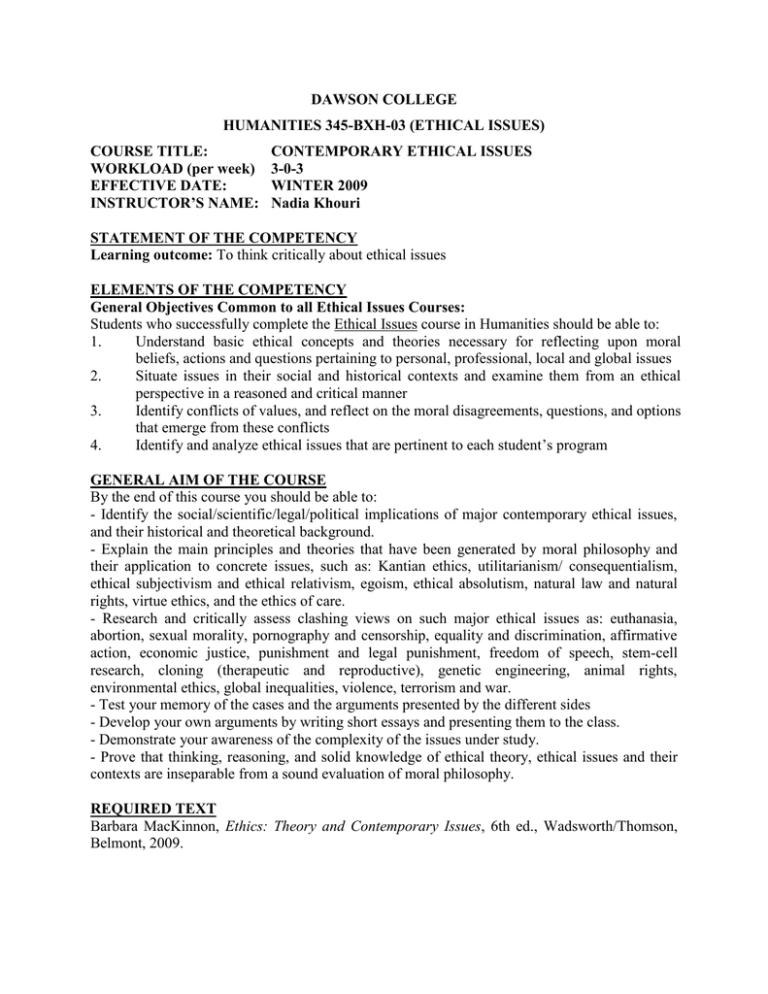Click to view in Word format
advertisement

DAWSON COLLEGE HUMANITIES 345-BXH-03 (ETHICAL ISSUES) COURSE TITLE: WORKLOAD (per week) EFFECTIVE DATE: INSTRUCTOR’S NAME: CONTEMPORARY ETHICAL ISSUES 3-0-3 WINTER 2009 Nadia Khouri STATEMENT OF THE COMPETENCY Learning outcome: To think critically about ethical issues ELEMENTS OF THE COMPETENCY General Objectives Common to all Ethical Issues Courses: Students who successfully complete the Ethical Issues course in Humanities should be able to: 1. Understand basic ethical concepts and theories necessary for reflecting upon moral beliefs, actions and questions pertaining to personal, professional, local and global issues 2. Situate issues in their social and historical contexts and examine them from an ethical perspective in a reasoned and critical manner 3. Identify conflicts of values, and reflect on the moral disagreements, questions, and options that emerge from these conflicts 4. Identify and analyze ethical issues that are pertinent to each student’s program GENERAL AIM OF THE COURSE By the end of this course you should be able to: - Identify the social/scientific/legal/political implications of major contemporary ethical issues, and their historical and theoretical background. - Explain the main principles and theories that have been generated by moral philosophy and their application to concrete issues, such as: Kantian ethics, utilitarianism/ consequentialism, ethical subjectivism and ethical relativism, egoism, ethical absolutism, natural law and natural rights, virtue ethics, and the ethics of care. - Research and critically assess clashing views on such major ethical issues as: euthanasia, abortion, sexual morality, pornography and censorship, equality and discrimination, affirmative action, economic justice, punishment and legal punishment, freedom of speech, stem-cell research, cloning (therapeutic and reproductive), genetic engineering, animal rights, environmental ethics, global inequalities, violence, terrorism and war. - Test your memory of the cases and the arguments presented by the different sides - Develop your own arguments by writing short essays and presenting them to the class. - Demonstrate your awareness of the complexity of the issues under study. - Prove that thinking, reasoning, and solid knowledge of ethical theory, ethical issues and their contexts are inseparable from a sound evaluation of moral philosophy. REQUIRED TEXT Barbara MacKinnon, Ethics: Theory and Contemporary Issues, 6th ed., Wadsworth/Thomson, Belmont, 2009. PROGRAM-ADAPTED ASSIGNMENT You will be required to identify the ethical issues pertinent to your own program and to write one major term paper on them. SPECIFIC INSTRUCTIONAL OBJECTIVES AND COURSE CONTENTS 1) Ethics and ethical reasoning Ethical theory. Descriptive statements and normative claims Evaluating and making good arguments: ethics and other types of evaluation Distinction between sets of beliefs tied to religion, and ethical judgment. The divine command theory. Plato’s Euthyphro 2) Ethical subjectivism and ethical relativism The diversity of moral views, moral pluralism and moral uncertainty Forms of ethical pluralism Situational differences: arguments pro and con Moral isolationism: Mary Midgley’s critique 3) Utilitarianism/Consequentialism Historical sources: hedonism, epicureanism The intrinsic good, and the greatest happiness principle: quantitative and qualitative The utility principle and consequentialism: Jeremy Bentham and John Stuart Mill Evaluating harms The question of ends and means. The cost-benefit equation Act and rule utilitarianism 4) Kant’s moral theory What gives an act moral worth? What is the right motive? The categorical imperative and moral obligation Hypothetical imperatives Autonomy, duty, good will and universality 5) Natural law and natural rights Natural law and laws of nature Aristotle and natural law Human nature and the human good: history of different interpretations Evaluating natural law theory and natural rights theory Discussion of Aristotle’s Nicomachean Ethics, John Locke’s Second Treatise of Civil Government and Martin Luther King Jr’s Letter From a Birmingham Jail 6) Euthanasia Meaning and types of euthanasia Brain death and persistent vegetative state The moral significance of voluntariness Ordinary and extraordinary measures Making moral judgments about euthanasia. Morality and the law Consequentialist and nonconsequentialist concerns 7) Abortion Stages of fetal development Abortion and the law/rights arguments: Roe v. Wade. Abortion in Canada The moral question, consequentialism and nonconsequentialism Fetal/Personhood issues: arguments for and arguments against 8) Sexual Morality. Pornography Conceptual matters: what is and is not sexual Factual matters: consequences of certain sexual practices and their effect on sexual morality Sexual morality and ethical considerations: utilitarian and Kantian Pornography and art, pornography and obscenity: free speech and the law Pornography and liberty-limiting principles: harm, social harm, and offense Legal paternalism/legal moralism 9) Equality and discrimination Civil rights law Racism and sexism, stereotypes, racial profiling, hate crimes: historical overview The principle of equality and considerations of justice Affirmative action, compensation, and preferential treatment Reverse discrimination: evaluation of social benefits and harms. Consequentialist and nonconsequentialist arguments 10) Legal punishment Punishment and responsibility, distinction between punishment and legal punishment Arguments for and against punishment The deterrence argument Civil disobedience and the law (Socrates, Thoreau, Gandhi, Martin Luther King Jr, Nelson Mandela) The retributivist argument, revenge, and the lex talionis The death penalty. Arguments on deterrence grounds/on retributivist grounds. Abolition of the death penalty 11) Stem cell research, cloning, and genetic engineering Facts on genetic research Therapeutic and reproductive cloning Human cloning: ethical issues Genetic engineering/stem cell research/gene therapy: ethical issues Genetically modified plants and animals: ethical issues Genetic screening, privacy, and conflicts of interest 12) Environmental ethics/Animal rights The environment: intrinsic value perspective, use value perspective, natural law perspective Anthropocentrism, ecocentrism/biocentrism, deep ecology, ecofeminism Animals and sentience: Jeremy Bentham, Peter Singer Cruelty and predation Animals as moral agents or moral patients The question of moral rights Animal experimentation: three positions Endangered species: anthropocentric and ecocentric arguments Sustainable development 13) Violence, terrorism, and war Violence: causes and correlations Terrorism: definitions Pacifism: consequentialist and nonconsequentialist arguments Just war theory: jus ad bellum, jus in bello Weapons of mass destruction War crimes and universal human rights TEACHING METHODS/LEARNING ACTIVITIES Lecturing 10-minute student presentations of prepared written case analysis to be shown to the class on the overhead projector Class work with study guides and short essay questions identifying concepts, approaches and methods used in the analysis of specific ethical issues. You are expected to think and express yourself clearly and critically about ethical issues. You must avoid generalizations, be specific, and support your arguments with facts and concepts from ethical philosophy. BXHcourse outline2.doc




